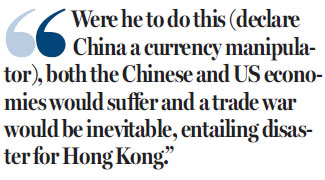What a Trump presidency would mean for the SAR's trade sector
Updated: 2016-05-20 09:04
By Ken Davies(HK Edition)
|
|||||||||
Editor's note: This is the first of two articles by Ken Davies discussing the impact on Hong Kong if Donald Trump is elected president.
What will be the consequences for Hong Kong if Donald Trump is elected president of the United States?
At the moment it looks like Hillary Rodham Clinton will win the presidential election. The odds at Ladbrokes - a gambling company in London that takes bets on world events - are currently 2/5 in her favor, with Trump second at 5/2. But Clinton voters may change their minds, or decide to stay home, and another terrorist attack in Europe could propel voters Trumpward.
Because of the peculiar way in which Trump has appeared to make policy "on the hoof" and then intensify extreme statements when the public reacts positively, we need to distinguish between what he has said he will do and what he may be likely to do if he actually makes it to the White House.
Politicians who take extreme positions before gaining power do not always moderate those positions when they are in a position to implement them, so it is always important to take even the most outlandish statements seriously.

In this article and the one that follows, I will put more focus on the policies he has outlined on his own website, presumably after taking time to consider them more carefully than his utterances in public meetings.
The main worry in Hong Kong has to be that Trump will deliver on his promise to "reform the US-China trade relationship". He presents this as a four-part program:
His first goal is to bring China to the bargaining table "by immediately declaring it a currency manipulator".
The next goal is to "force China to uphold intellectual property laws and stop their unfair and unlawful practice of forcing US companies to share proprietary technology with Chinese competitors as a condition of entry to China's market".
His third goal is to reclaim American jobs and revive American manufacturing by "putting an end to China's illegal export subsidies and lax labor and environmental standards".
Lastly, Trump would lower the US corporate tax rate to keep American companies and jobs in the US, and lower "our debt and deficit so China cannot use financial blackmail against us", while bolstering the US military presence in the East and South China Seas "to discourage Chinese adventurism".
By far the worst news for Hong Kong is how Trump would try to eliminate the US trade deficit with China. Declaring China a currency manipulator will, he says on his website, "begin a process that imposes appropriate countervailing duties on artificially cheap Chinese products". In January, Trump told the New York Times he would put a 45-percent tariff on Chinese exports to the US. He has not backtracked on this proposal.
Were he to do this, both the Chinese and US economies would suffer and a trade war would be inevitable, entailing disaster for Hong Kong, since the Chinese mainland and US are the SAR's two largest export customers, together making up 63.2 percent of the total in 2015. Local companies finishing and/or packaging exports from the mainland destined for the US would be hit, as would Hong Kong's container port and transshipment business. There would be a serious knock-on effect on other sectors.
The extent of the damage would depend on retaliation by the Chinese central government and subsequent events - impossible to predict, but almost certainly resulting in a severe recession.
All the above is based on what Trump says he will do. Of course, presidents, like leaders everywhere, often have to trim their sails once they reach office, and Trump is likely to be no exception. The US Department of Commerce will explain to him that the US cannot breach World Trade Organization rules that it was instrumental in framing and enforcing. Pressure to moderate extreme policies will come internally, from White House officials, the Republican Party and US business groups, also from US's allies and trade partners. Trump will have to deal with Congress, not just rule by fiat (as all his promises so far have assumed).
The 45-percent tariff on Chinese imports may be modified or dropped after some face-saving negotiation. Demands for instant change in China will recede as it becomes evident that they cannot be met instantly.
However, it would be dangerous to take it for granted that the anti-China policies will evaporate. Trump would have to show that he was different from Obama, and his personal history is one of tough, uncompromising negotiating style and high-risk tolerance.
|
AKen Davies The author is president of Growing Capacity, Inc, and was formerly chief economist, Asia and bureau chief for the EIU in Hong Kong and head of global relations in the OECD's Investment Division. |
(HK Edition 05/20/2016 page9)
